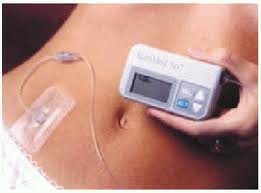Google updates on Treprostinil
A more stable prostacyclin analogue, treprostinil has a half life of four hours and can be
administered subcutaneously FDA approved in 2002 or intravenously approved in 2004.
A randomized, placebo controlled study of subcutaneous treprostinil in 470 WHO class
III or IV patients with IPAH or PAH associated with connective tissue disease, or CHD
demonstrated a dose related improvement in six minute walk distance of 16 meters in the
whole treated group and 38 meters in the quartile of patients receiving the highest dose.
Not all patients could be dose increased to a high level because of pain at the infusion site
in the majority, as well aside effects of headache, diarrhea, rash and nausea.
The potential advantages of intravenous treprostinil are the absence of site pain, as well
as easier preparation and administration and less rebound compared to epoprostenol. An
open label study of intravenous treprostinil in 16 symptomatic PAH patients showed an
82 meter increase in six minute walk distance after 12 weeks, and improved pulmonary
henodynamics. Most patients originally treated with epoprostenol can be switched over to
intravenous treprostinil with maintenance of six minute walk distance though at a larger
dose. Studies of inhaled and oral administration of treprostinil are underway.
The prostacyclin analogue iloprost is an inhaled aerosol approved for use in 2004.
In a randomized, placebo-controlled 12 week study, iloprost produced a placebo-
corrected improvement in six minute walk distance by 36 meters in two hundred patients
with symptomatic IPAH, PAH associated with connective tissue disease or appetite
suppressants, or PH related to inoperable chronic thromboembolic disease. Long term
maintenance of beneficial effects of exercise capacity and hemodynamics have been
observed. Iloprost may cause side effects common to prostacyclin analogues including
headache, flushing, and jaw pain, and also may cause cough.
The objective of treatment with an endothelin receptor antagonist is to minimize the
impact of excessive endothelin effects in the pulmonary vasculature in patients with
PAH. Bosentan is a non-selective, or dual, A and B-endothelin receptor antagonist
available in oral form. Placebo controlled randomized drug trials have shown a relative
improvement in six minute walk distance ranging from 36 to 76 meters, an improvement
in pulmonary hemodynamics and delay in clinical worsening.



